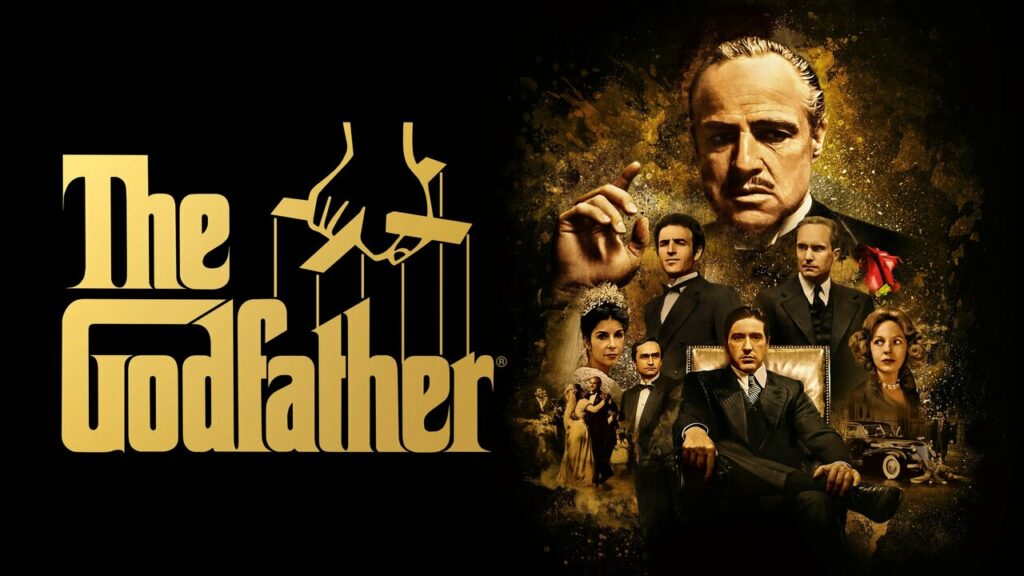The Godfather films, aren’t only stories about criminals, they’re stories about the world we live in – hierarchy pretending to be community, patriarchy pretending to be protection, capitalism pretending to be freedom, politicians pretending to be legitimate, family pretending to be love. To put it simply it’s the #deathcult mythos in cinematic form.
They’re parables about how hierarchy rots everything it touches. The writers, Coppola and Puzo create a world where the mafia isn’t an aberration but a mirror of #mainstreaming power: patriarchal families, capitalist accumulation, politicians in pockets, and a state captured by private interests. It’s #deathcult logic wrapped in myth.
It opens not with the fake glamour of today’s action films, with none of the politically correct obscuring, but with real working people doing real life, it’s a view outside the current post truth polished mess. Lifting the lid to show what’s behind the shiny surface blindness, you watch this film today to experience filmmaking and politics, like meany older films, the pacing is slow. Our attention spans are broken, good to keep this in your mind as you learn to see anew this ethnography of a pastime.
The Corleones aren’t only monsters from the shadows; they’re the real face of American power with the mask removed. Vito Corleone is an older, more honest version of the #neoliberal billionaire who buys judges today. The story’s “crime families” are stand-ins for competing capitalist blocks. The story is a metaphor for how power protects itself, how legitimacy is a costume, and how the violence of the system, hides behind talk of “family,” “business,” “respect,” and “tradition.”
The first two films critique the world we live in, a family built on the same contradictions that tear it apart. Quotes:
- “It’s not personal, it’s strictly business.” → the neoliberal worldview: harm without responsibility.
- “I’m going to make him an offer he can’t refuse.” → the essence of capitalist coercion: “choice” backed by threat.
- “We’re bigger than U.S. Steel.” → capitalism’s real goal: monopoly masked as freedom.
- “Just when I thought I was out…” → no exit from systems built on domination.
The films are showing us the mythology of the mainstreaming #deathcult. America as Mafia, Mafia as America.
The first film opens with a small man being crushed by the system: a father whose daughter is brutalized, and the courts shrug. This is how neoliberalism works: public services are defunded, fail, people are pushed into private “solutions.” Justice outsourced to a Don is no different from healthcare outsourced to a corporation: both sell what should be a right. Vito’s “friendship” is the same as corporate “philanthropy”, a mask over structural violence.
The “family” keeps up appearances – the bourgeoisie’s favourite hobby – while patriarchal rot devours everyone inside. Connie is beaten by Carlo, but the family shrugs because patriarchal norms demand they stay out of a “private matter.” The same system that fetishizes “protecting our women” abandons them whenever protection would inconvenience male hierarchy. It’s about too much control and not enough care.
Competition, crises, violence – the capitalist cycle – it is useful to see the mythology in #KISS terms, the Five Families aren’t criminals; they’re competing capitalist firms. Their war is a stand-in for economic crises. Clemenza even says these things happen “every ten years,” which is basically the capitalist business cycle.
The Tattaglias and Barzinis pushing heroin aren’t “more evil”, they’re the next stage of capitalism’s expansion, accumulation demanding new markets. Violence is “nothing personal,” which is how every predatory corporation sees the world.
Michael, capitalism’s golden child, was meant to be “legitimate” – a senator, a governor – respectable frontman to maintain the illusion. Instead, he becomes the perfect neoliberal mess: calm, disciplined, efficient, emotionally repressed, willing to destroy anyone to maintain order.
He is the patriarchal son weaponized. The obvious patriarchy flowing through the films is a useful reminder for some and insight for meany about what is the reality behind closed doors in the current hard right with their calling for “family values”.
By the end of the first film, when he wipes out all rivals, standing in a church professing faith, we see the metaphor: authoritarian capitalism, patriarchal religion, and state legitimacy all fused together. He “renounces Satan” while becoming him, the system itself.
Part II, sharpens this critique. We see young Vito’s rise in a world where #feudalism is giving way to capitalism, one hierarchy composting into another. He kills Don Fanucci (feudal power) so he can build Genco Olive Oil (capitalist power). Same structure, new branding.
Meanwhile, Michael, the more matured form of this system, expands the empire into Nevada, New York, Miami, Sicily, Cuba. It’s the globalisation arc. And like all global empires, it’s built on betrayal: Fredo’s betrayal (internal collapse), Kay’s rejection (patriarchal fragility exposed), Michael’s violence against his own (self-destruction inherent in all hierarchical systems). By killing Fredo “for the family,” Michael destroys the family. Capitalism works the same way: protecting profit destroys society.
And the ending is the #techcurn lesson: systems built on secrecy, power, and control always collapse inward, devouring the people they claim to protect. Michael Corleone is neoliberalism in human form. Vito is the earlier, “nicer” version of the same system. And the people around them? Compost.

The Cuba revolution is the one moment where the system cracks – the #openweb moment of the film – where people try to reclaim the commons, break the hierarchy, stop being pawns.
On the subject of filmmaking, a lot of the films’ technics now look every day, this is not because they are, they are brilliant, it’s because every film for the last 50 years has coped them and thus diluted their shine with mediacy. Open your eyes, afresh, watch the films, you are seeing the invention of cinema. When you are used to a lifetime of derivative drivel.
Were is this media today?